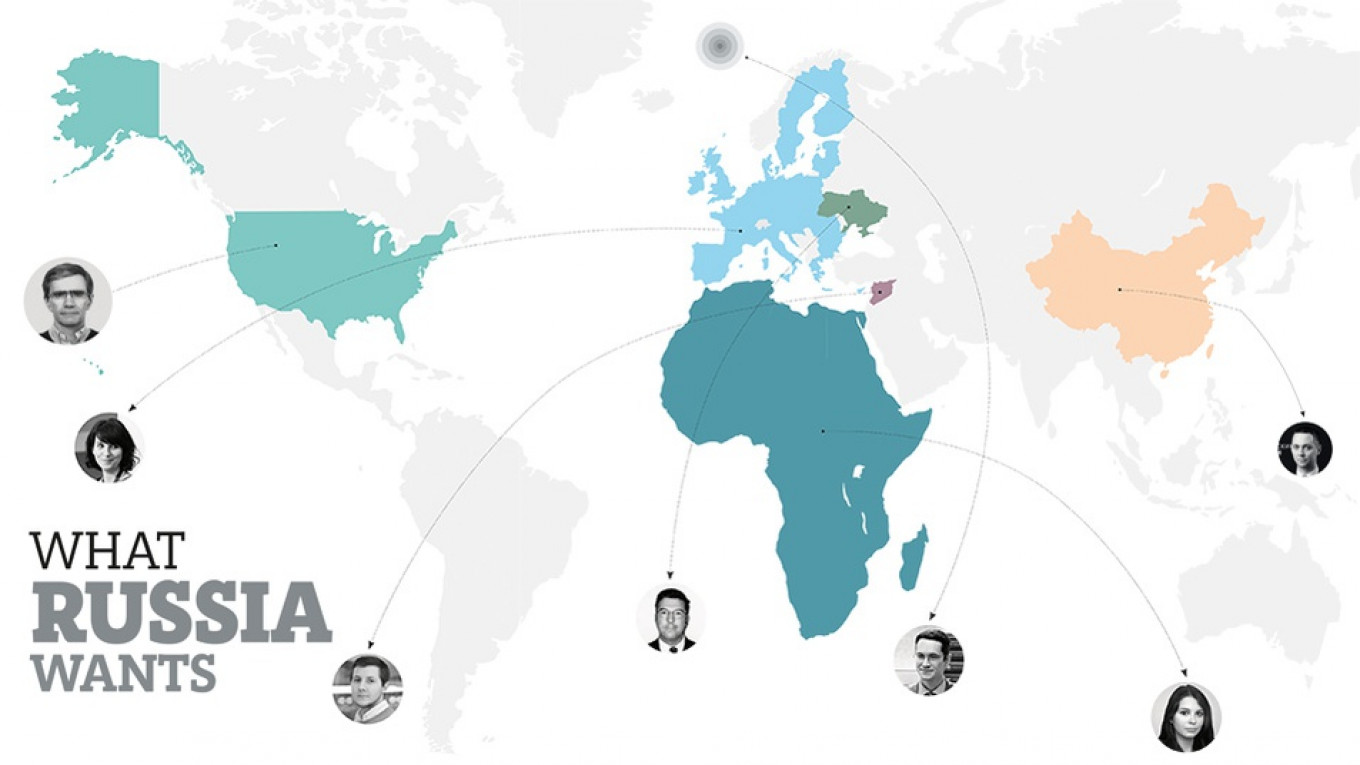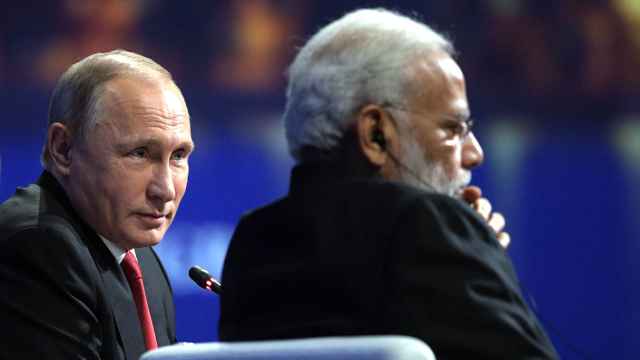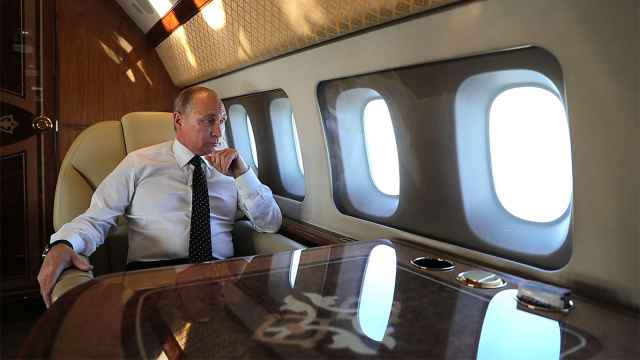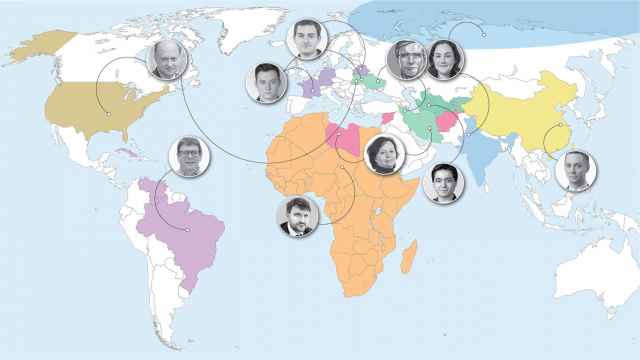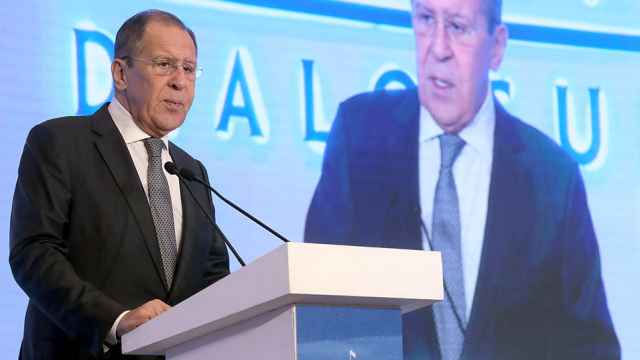Russia stands accused of meddling in Western elections, cosying up to dictatorial regimes in the Middle East and supporting fringe political groups within the European Union. What exactly does Russia have in store for the world in 2019? The Moscow Times asked six experts in Russia's foreign policy to weigh in.

Moscow Wants a Veto on U.S. Foreign Policy
Russia’s goals with the United States are incoherent and inarticulate. What’s more, they are not defined in ways that lend themselves to being achieved through traditional diplomacy. Rather, Russia is seeking to dismantle the U.S.-led international order and secure a veto over U.S. actions abroad.
The Kremlin’s fear of “crumbling under U.S. pressure” has pushed it into an unyielding, intransigent posture across a range of issues. The “all or nothing, everything is linked” approach hampers Russia’s diplomacy, reducing its options to what might be called “hopeful procrastination” for a better moment to engage Washington.
In 2019, Moscow will focus on summits, with Putin invited to Washington and Trump to Moscow later in the year. For Russia, the only way to influence U.S. policy is to “play Trump,” capitalizing on his inexperience and impulsiveness. Moscow currently deals with National Security Advisor John Bolton who, like a force of nature, cannot be reasoned with.
The immediate priority is to safeguard the U.S.-Russia nuclear arms control regime, which is under threat by Trump’s decision to withdraw from the INF Treaty and his skepticism towards extending New START beyond 2021. Russia might be forced to accept Bolton’s plan for a symbolic nuclear accord (like the Moscow Treaty of 2002) that would not limit deployment options. The good news for the Kremlin is that the majority Democrat Congress may not fund Trump’s nuclear build-up.

Can Russia Coax the EU Into Lifting Sanctions?
Vladimir Putin is probably going to continue wooing European Union leaders who have a soft stance on sanctions imposed on Russia after its incorporation of Crimea in 2014.
Pundits point out that the Kremlin is cooperating with fringe parties across the EU, both on the far right and on the far left. For example, Russia has ties with Alternative for Germany but also Die Linke, both of which run on a platform of improving relations with Russia. This strategy applies to EU leaders, too. If Hungarian President Viktor Orban is prepared to visit Moscow and cooperate with the Kremlin, then the Kremlin will talk to Orban.
Because Russia has become toxic, it will have to make do with whatever European leaders it can get. And right now it can only win over fringe figures. But this is a pragmatic policy, and it seems likely that Moscow will continue to pursue this strategy into 2019.
German Chancellor Angela Merkel’s announcement that she is leaving German politics does not actually represent an opportunity for Moscow. Merkel knows Putin. They have a relationship, albeit a difficult one. Whoever the next chancellor is — and the candidates are all critical of Russia — they won’t have the same rapport with Putin. It’s hard to see how Russia benefits here.
Can Russia actually persuade a European power to use its veto power to end sanctions? When we hear about EU countries threatening to use their veto, it’s usually just a bargaining chip for extra funding or preferential treatment on a particular issue. I don’t see any European country really standing up right now and saying, “We’re going to veto the extension of sanctions.” Unless there is real progress in Donbass, of course.

Russia Has Won the War in Syria, but Can It Win the Peace?
As the fighting in Syria dies down, Russia’s main task will be to align its efforts to find a diplomatic solution to the conflict in line with the United Nation’s peace process. So far, Russia’s military-diplomatic approach has been seen as obstructing broader international diplomatic efforts.
Russia will increasingly struggle to keep the government in Damascus in line. As Bashar Assad’s government no longer feels threatened by its opponents, it has zero incentive to deliver on political reforms, which will further put Russia in the spotlight.
In 2019, Moscow will also need to double down on reconstruction efforts in Syria. Since Moscow’s own capacity to rebuild the country is limited, it will need to convince the international community — first and foremost the EU— to unlock reconstruction funding, which will be a daunting task given the Syrian government's reluctance to reform.
While the war in Syria is coming to an end, the competition between global and regional powers over the future of the war-torn country will only intensify. Russia will need to strike a balance between the different concerns of its partners, which include Turkey and Iran.
It will find itself at odds with the U.S. and will need to invest a lot of effort to prevent skirmishes between Iran and Israel from intensifying.

Russia Believes That Creating Tension Could Swing the Dynamic in Its Favor
There are many uncertainties about how Russia’s relationship with Ukraine will unfold next year. We can never be entirely sure that Putin is a rational actor, but his best approach would be caution. Ukraine is more resilient than it was, and Russia’s ability to change the situation in ways it wants is far from certain. Still, Russia believes that the creation of tension can shift the dynamic in its favor.
The key event to look out for is Ukraine’s presidential election in March. I don’t think Russia can realistically expect their guy to win the presidency — that’s not how Ukrainian politics works anymore. But parliamentary elections in October are a different matter. It is entirely possible that certain Russian-backed parties could come to power.
The number one priority for Russia in its relationship with Ukraine is the ongoing war in the east. A new front, some kind of massive escalation, is unlikely.
But a flare-up is entirely possible. The rupture between the Orthodox Churches in Moscow and Kiev is a bone of contention, which will take years to resolve. Not to mention the disputes over Russia’s militarization of the Sea of Azov or the ongoing trade war between the two. But Ukraine is only one part of a bigger equation between Russia and the West. The Kremlin isn’t happy with the status quo in Ukraine, but it is limited by what it can do militarily in view of how the West may respond and by its own economic constraints.

Russia Wants to Modernize — Not Militarize — the Arctic
The fact that huge swathes of Russia fall within the Arctic circle means the region is not only a pressing domestic concern for Russia — it is also a foreign policy priority. Accordingly, Moscow has two main goals in the region. First, to secure large investments in Arctic infrastructure and the economy. Second, to modernize its military presence to protect those investments, all while counter balancing the aspirations of the United States and NATO.
Western journalists regularly accuse Russia of militarizing the Arctic. In reality, Russia’s only real military presence here is in Arkhangelsk and Murmansk. These ports are Russia’s only access point to the world’s ocean. Strategically, there are no other viable options.
Developing the Arctic economically through new shipping routes or oil and gas projects is made all the more difficult by the harsh climate, the poor existing infrastructure and the Arctic’s vast expanses. Today, there is no success story that Russia might use as a template to follow. Time and money are the only answers to this problem.
What’s more, Russia will increasingly have to compete with other countries’ Arctic aims. In particular, Moscow should continue negotiations with China, so as to better understand each other’s red lines. U.S. sanctions and the fact that Russia is still drafting legislation specifically for the Arctic region means it will be more difficult to attract foreign or domestic investment.

Russia Needs a Long-Term Strategy in Africa
I doubt whether Russia has a broader Africa policy or long-term strategy there. While Moscow is still contributing to programs underG8 patronage — which is peculiar considering Russia’s status in the group — that may soon change.
At the same time, some private and commercial actors have their own interests there. Recent media reports suggest that Russian private military contractors are working in at least 10 countries on the continent, but the significance of those deployments may be inflated. Today, Russia wants to deepen its understanding of the business climate and explore trade and partnership opportunities in Africa.
An increasing number of bilateral events have been planned recently, which the Foreign Ministry hopes will culminate in a summit of more than 50 African leaders hosted by Russia in 2019. In the meantime, the meetings will be used to discuss the barriers to Russia’s trade and cooperation with African countries.
Fifty years ago, African leaders had two basic options: A pivot towards the West, i.e.capitalism or neo-imperialism, or towards socialist development associated foremost with Moscow. Now, Russia’s main goal is to decide what it can offer that hasn’t already been made available by Chinese investment or Western aid.

Can China Fill the Void Left by Western Sanctions?
We shouldn’t expect any major departures from the trajectory the Russia-China relationship has taken since the annexation of Crimea in 2014. Russia now sees Western sanctions as all but permanent, which is why Russia is trying to build a relationship with China that will soften economic losses from its deteriorating ties with the United States and the EU. In 2019, Russia’s primary goal will be cementing oil and gas deals with China.
Russia, however, will be increasingly wary of Chinese military interests in Central Asia. Moscow has accepted China’s economic dominance in the former Soviet states, but it is not ready to cede its role as the guarantor of security or the region’s major military force. We can see that China is increasing its military presence in Central Asia through bilateral arms deals with local armies and occasionally even with boots on the ground, for instance in Tajikistan.
Either this will become a point of friction between Russia and China, or Moscow will have to decide that China’s role is a complementary one, and that the major enemy is the United States.
A version of this article appeared in our special "Russia in 2019" print issue. For more in the series, click here.
A Message from The Moscow Times:
Dear readers,
We are facing unprecedented challenges. Russia's Prosecutor General's Office has designated The Moscow Times as an "undesirable" organization, criminalizing our work and putting our staff at risk of prosecution. This follows our earlier unjust labeling as a "foreign agent."
These actions are direct attempts to silence independent journalism in Russia. The authorities claim our work "discredits the decisions of the Russian leadership." We see things differently: we strive to provide accurate, unbiased reporting on Russia.
We, the journalists of The Moscow Times, refuse to be silenced. But to continue our work, we need your help.
Your support, no matter how small, makes a world of difference. If you can, please support us monthly starting from just $2. It's quick to set up, and every contribution makes a significant impact.
By supporting The Moscow Times, you're defending open, independent journalism in the face of repression. Thank you for standing with us.
Remind me later.


